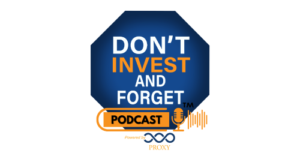Introduction:
In the ever-evolving world of finance and investment, staying informed and making informed decisions is crucial. Welcome to “Don’t Invest and Forget,” a weekly financial news magazine hosted by Pat Vitucci, an industry veteran with over 30 years of experience in finance and investment planning, especially in the realm of retirement planning. In this edition, we’ll delve into recent developments that are shaping the financial landscape, from the Federal Reserve’s interest rate decisions to global economic tensions. So, sit tight as we navigate the currents of the financial world.
The Fed’s Pause on Rate Hikes:
One of the most significant recent developments in the financial world is the Federal Reserve’s decision to pause its rate hikes, at least for now. This move comes as a sigh of relief for many, as it provides some stability to the financial markets. However, it’s important to note that the Fed has hinted at the possibility of further rate hikes before the year’s end. The decision to pause was data-driven, with various economic indicators pointing toward the necessity of such a move. The Federal Reserve’s cautious approach is a testament to its commitment to managing inflation and employment levels.
Challenges in the Housing Market:
The housing market is another area of concern. The rapid increase in mortgage rates, from around 3 percent to over 7 percent, has significantly impacted affordability. Potential homeowners now find themselves able to afford approximately 40 percent less house than they could just 18 months ago. With 80 percent of existing mortgage holders still enjoying rates under 5 percent, the prospect of trading that for a 7 percent mortgage discourages many from entering the housing market. Consequently, home sales have seen a decline.
Consumer Spending and Auto Industry:
Consumer spending plays a vital role in the economy, and two major components of this spending are housing and automobile purchases. As mentioned earlier, the housing market’s affordability issues are a concern. Similarly, buying a new car has become a significant expense, with a $50,000 vehicle translating to an $800 monthly payment. These financial constraints are causing consumers to rethink their big-ticket purchases.
Labor Strikes and Government Shutdown:
The labor landscape is also undergoing changes. The United Auto Workers (UAW) initiated strikes in select plants across major automakers, demanding a 20 percent wage increase over five years. This demand aligns with the challenges posed by rising inflation, as employees seek to keep up with the increasing cost of living. Additionally, the looming threat of a government shutdown remains. The high national debt level, exceeding $32 trillion, demands attention, and fiscal responsibility is essential to address the budget’s fragile state.
Economic Tensions with China:
Beyond domestic concerns, international economic tensions are brewing, particularly with China. Recent actions, such as restricting government employees from using Apple phones and limiting exports of critical minerals used in silicon production, indicate an economic war may be underway. This escalation could have repercussions for both nations and global markets.
Conclusion:
In this ever-changing economic landscape, it’s vital to stay informed and be prepared for potential financial challenges. While some aspects, like the Federal Reserve’s pause on rate hikes, provide temporary stability, other issues, such as the housing market and international tensions, require careful consideration. To navigate these financial waters successfully, it’s essential to consult with qualified financial professionals and stay informed about the latest developments. Remember, your financial future depends on informed decisions and careful planning.

